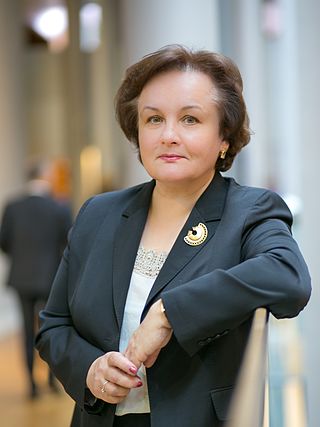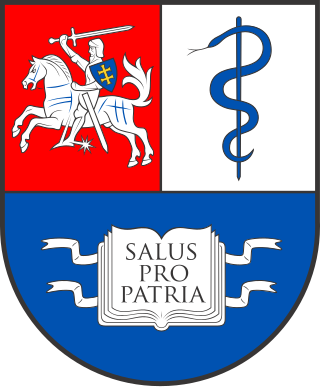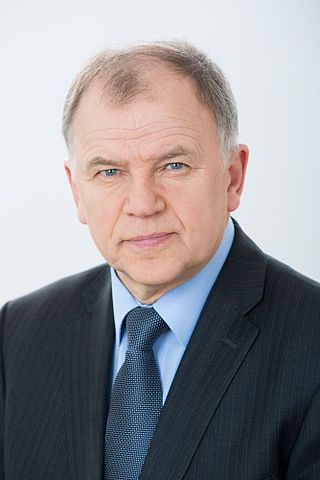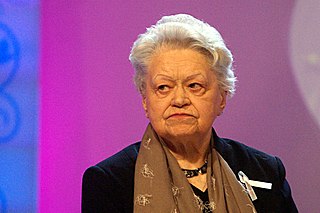
Kaunas is the second-largest city in Lithuania after Vilnius, the fourth largest city in the Baltic States and an important centre of Lithuanian economic, academic, and cultural life. Kaunas was the largest city and the centre of a county in the Duchy of Trakai of the Grand Duchy of Lithuania and Trakai Palatinate since 1413. In the Russian Empire, it was the capital of the Kaunas Governorate from 1843 to 1915.

Algirdas Mykolas Brazauskas was a Lithuanian politician who served as the fourth president of Lithuania from 1993 to 1998. He also served as the prime minister of Lithuania from 2001 to 2006. Brazauskas was the first democratically elected president of post-Soviet Lithuania.

The Lithuanian Soviet Socialist Republic, also known as Soviet Lithuania or simply Lithuania, was de facto one of the constituent republics of the Soviet Union between 1940–1941 and 1944–1990. After 1946, its territory and borders mirrored those of today's Republic of Lithuania, with the exception of minor adjustments to its border with Belarus.

The Democratic Labour Party of Lithuania was a political party in Lithuania. It was the successor of the Soviet-era Communist Party of Lithuania. The youth organization of LDDP was called Lithuanian Labourist Youth Union.

Vytautas Magnus University (VMU) is a public university in Kaunas, Lithuania.The university was founded in 1922 during the interwar period as an alternate national university.

Laima Liucija Andrikienė is a Lithuanian politician serving as member of the European Court of Auditors since November 2022.

Lithuanian University of Health Sciences is a medical school in Kaunas, Lithuania. The present-day Lithuanian University of Health Sciences is a consolidation of two institutions of higher education, Kaunas University of Medicine and the Lithuanian Veterinary Academy. It uses the Hospital of Lithuanian University of Health Sciences Kaunas Clinics and the Kaunas Red Cross Hospital as teaching hospitals.

The January Events were a series of violent confrontations between the civilian population of Lithuania, supporting independence, and the Soviet Armed Forces. The events took place between 11 and 13 January 1991, after the restoration of independence by Lithuania. As a result of the Soviet military actions, 14 civilians were killed and over 140 were injured. The 13th of January was the most violent day of the month in Lithuania. The events were primarily centered in the capital city Vilnius, but Soviet military activity and confrontations also occurred elsewhere in the country, including Alytus, Šiauliai, Varėna and Kaunas.
ELTA is a Lithuanian news agency based in the Lithuanian capital Vilnius. In a day, it receives about 5,000 news articles and produces about 300 articles in Lithuanian, Russian, and English. ELTA cooperates with foreign news agencies such as Reuters, Associated Press, Deutsche Presse-Agentur, Polish Press Agency and others.

The Kaunas University of Technology is a public research university located in Kaunas, Lithuania. Established in 1922, KTU has been seen as one of Lithuania's top science education centers. In 2021, KTU was ranked the second-best university in Lithuania.

Zigmas Zinkevičius was a Lithuanian academician, Baltist, linguist, linguistic historian, dialectologist, politician, and the former Minister of Education and Science of Lithuania (1996–1998). Zinkevičius authored over a hundred books, including the popular six-volume "History of the Lithuanian Language" (1984–1994), and over a thousand articles, both in Lithuanian and other languages. He was an academician of the Lithuanian Catholic Academy of Science since 1991 and a full member of the Lithuanian Academy of Sciences from 1990 to 2011, when he became an emeritus member.

Greece–Lithuania relations are the bilateral relations between Greece and Lithuania. Greece has an embassy in Vilnius. Lithuania has an embassy in Athens. Both countries are full members of the Organization for Security and Co-operation in Europe, Council of Europe, European Union and NATO.

Vytenis Povilas Andriukaitis is WHO Special Envoy for the European region, the former European Commissioner for Health and Food Safety, a heart surgeon, a co-signatory to the 1990 Act of the Re-Establishment of the State of Lithuania.

The Supreme Committee for the Liberation of Lithuania or VLIK was an organization seeking independence of Lithuania. It was established on November 25, 1943, during the Nazi occupation. After World War II it moved abroad and continued its operations in Germany and the United States. VLIK claimed to be the legal representative of the Lithuanian parliament and government, but it did not enjoy international recognition. It was dissolved in 1990, when Lithuania re-established its independence.

Algirdas Butkevičius is a Lithuanian politician and was Prime Minister of Lithuania, serving between 2012 and 2016. He also served as the Minister of Finance from 2004 to 2005 and the Minister of Transport and Communications from 2006 to 2008. He led the Social Democratic Party of Lithuania from 2009 to 2017.

The Socialist People's Front is a left-wing political association in Lithuania formed in December 19, 2009, from a merger of the Front Party and Lithuanian Socialist Party. Held at Vilnius University, the party's foundation featured 102 delegates. The merger was approved by an affirmative vote of 96 delegates, with three against and one abstaining. The leader of the Lithuanian Socialist Party, Giedrius Petružis, refused candidacy for chairperson of the merged party, claiming a desire to return to academic life. The leader of the Front Party, Algirdas Paleckis, was unanimously chosen as the leader of the SPF.
The Diplomatic Service of the Republic of Lithuania is the part of the governmental service tasked with enforcing the foreign policy set by the President, the Parliament, and the Government of the Republic of Lithuania. The head of the service is the Foreign Minister.

Vilnius Gediminas Technical University is a public university located in Vilnius, Lithuania. There are 10 faculties including Antanas Gustaitis Aviation Institute, Architecture, Business Management, Civil Engineering, Creative Industries, Electronics, Environmental Engineering, Fundamental Sciences, Mechanics, Transport Engineering. Scientific research and experimental development is performed by 13 institutes, 3 research centres and 23 research laboratories.

Liudvika Laima Griciūtė was a Lithuanian oncologist and habilitated Doctor of Biomedical Sciences.

Pranas Lesauskis was a Lithuanian military person, management specialist, mathematician. In 1931 he defended his dissertation at the Royal University of Rome and became Doctor of Mathematics.


















